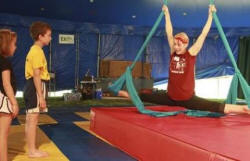|
 Lessons
on life, and money, at summer camp Lessons
on life, and money, at summer camp
 Send a link to a friend
Send a link to a friend
[February 13, 2015]
By Beth Pinsker
NEW YORK (Reuters) - Parents who are about
to write big checks for summer camp deposits may want to pause and
consider if they've made the best choice of camp so their kids have a
great social experience - but don't get over-indulged.That's one of the
messages in a new financial guide to raising kids, "The Opposite of
Spoiled," by the New York Times's "Your Money" columnist, Ron Lieber.
|
|
 Among all the ways parents spend money on their kids, Lieber says
summer camp provides a great opportunity to reinforce some solid
values. Pick the wrong kind of camp, and you wind up spoiling your
kids more, he says. Among all the ways parents spend money on their kids, Lieber says
summer camp provides a great opportunity to reinforce some solid
values. Pick the wrong kind of camp, and you wind up spoiling your
kids more, he says.
Reuters spoke with Lieber about how to make sure you end up on the
right side of the equation:
Q: How do you find a camp that suits your family's values?
A: Certainly ask around in your community. Resist the idea of
going where all the other kids are going. You can also talk to camp
consultants.
Then take a look around on visiting day. How are the people dressed?
What do they look like? What cars are they driving? And ask
yourself: Are these the sorts of people who are demonstrating the
kinds of values you have in your life?

Q: You mostly refer to overnight camp in your book because it
puts children in a completely new and separate environment. Do kids
get the same financial lessons at day camp?
A: There are all sorts of things you can accomplish with day
camp. I think of day camp as the outdoor variety at the local park -
every community has a version of this - and not the high-end day
camp with the heated swimming pool and air-conditioning everywhere.
Q: What do you think of specialty camps - for drama or sports
- that focus intensely on one interest rather than just general fun?
A: For children with true passion who are pursuing it because
they really love art or coding, that's something worth investing in
- if it's really coming from the child.
One hint is that they are asking to do it.
The context of the choices is useful to present in financial terms.
They might institute a form of symbolic deprivation. Maybe it will
be $3,000 for the summer, and the child can decide what's important
to him or her. It forces kids to make trade-offs.
Q: Should you tell your children how much summer camp costs,
or does that put too much pressure on them?
[to top of second column] |

A: Tell them when they're able to do the math. But if there
are sacrifices that the families have to make, it's worth bringing
the kids in on that so they can be part of picking the trade-offs.
Maybe they'd like to not go out to dinner to afford to go to a
special camp.
Q: Summer camp is usually a moneyless micro-society, so what
can kids actually learn about money?
A: One of the nice things about camp is that everyone comes
in with the same sets of things. Some may have slightly different
clothes, but if you bring too much, they send it back. Nobody gets
special food or has a special lunch unless they have allergies.
It's not a way to learn about having less money, it's a way to learn
about having less stuff - less of the regular urban or suburban
upper-middle-class existence.
Kids don't really need all of that stuff that surrounds them the
other 10 months of the year. They don't need their own bathroom,
they don't even need a door on the bathroom. They don't need
electronic entertainment. They need one another and their
imaginations.

Those lessons are the ones that they carry with them. It helps give
them perspective.
(Editing by Lauren Young and Bernadette Baum)
[© 2015 Thomson Reuters. All rights
reserved.] Copyright 2015 Reuters. All rights reserved. This material may not be published,
broadcast, rewritten or redistributed. |